The Cambridge History of China. Vol. 12: Republican China, 1912-1949, Part 1
Подождите немного. Документ загружается.

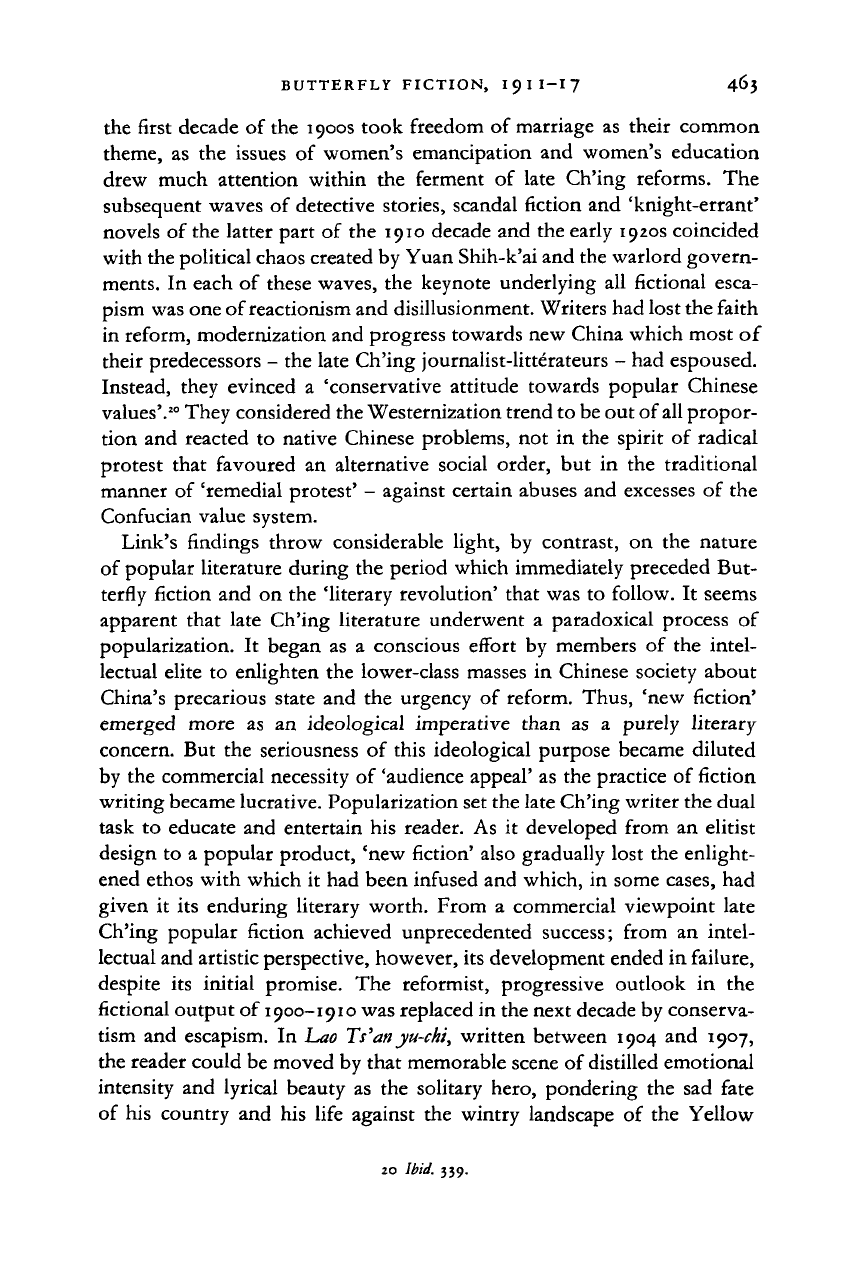
BUTTERFLY
FICTION, I 9 I I-I f 463
the first decade of the 1900s took freedom of marriage
as
their common
theme,
as the
issues
of
women's emancipation and women's education
drew much attention within
the
ferment
of
late Ch'ing reforms.
The
subsequent waves of detective stories, scandal fiction and 'knight-errant'
novels of the latter part
of
the 1910 decade and the early 1920s coincided
with the political chaos created by Yuan Shih-k'ai and the warlord govern-
ments. In each
of
these waves, the keynote underlying all fictional esca-
pism was one of reactionism and disillusionment. Writers had lost the faith
in reform, modernization and progress towards new China which most of
their predecessors
-
the late Ch'ing journalist-litterateurs
-
had espoused.
Instead, they evinced
a
'conservative attitude towards popular Chinese
values'.
20
They considered the Westernization trend to be out of all propor-
tion and reacted
to
native Chinese problems, not
in
the spirit
of
radical
protest that favoured
an
alternative social order, but
in
the traditional
manner
of
'remedial protest'
-
against certain abuses and excesses
of
the
Confucian value system.
Link's findings throw considerable light,
by
contrast,
on
the nature
of popular literature during the period which immediately preceded But-
terfly fiction and on the 'literary revolution' that was
to
follow.
It
seems
apparent that late Ch'ing literature underwent
a
paradoxical process
of
popularization.
It
began
as a
conscious effort
by
members
of
the intel-
lectual elite
to
enlighten the lower-class masses
in
Chinese society about
China's precarious state and the urgency
of
reform. Thus, 'new fiction'
emerged more
as an
ideological imperative than
as a
purely literary
concern. But the seriousness
of
this ideological purpose became diluted
by the commercial necessity of 'audience appeal' as the practice
of
fiction
writing became lucrative. Popularization set the late Ch'ing writer the dual
task
to
educate and entertain his reader. As
it
developed from an elitist
design to
a
popular product, 'new fiction' also gradually lost the enlight-
ened ethos with which
it
had been infused and which, in some cases, had
given
it
its enduring literary worth. From
a
commercial viewpoint late
Ch'ing popular fiction achieved unprecedented success; from
an
intel-
lectual and artistic perspective, however, its development ended in failure,
despite
its
initial promise.
The
reformist, progressive outlook
in the
fictional output of 1900-1910 was replaced in the next decade by conserva-
tism and escapism.
In
Lao Ts'anyu-chi, written between 1904 and 1907,
the reader could be moved by that memorable scene of distilled emotional
intensity and lyrical beauty as the solitary hero, pondering the sad fate
of his country and his life against the wintry landscape
of
the Yellow
20
Ibid.
339.
Cambridge Histories Online © Cambridge University Press, 2008
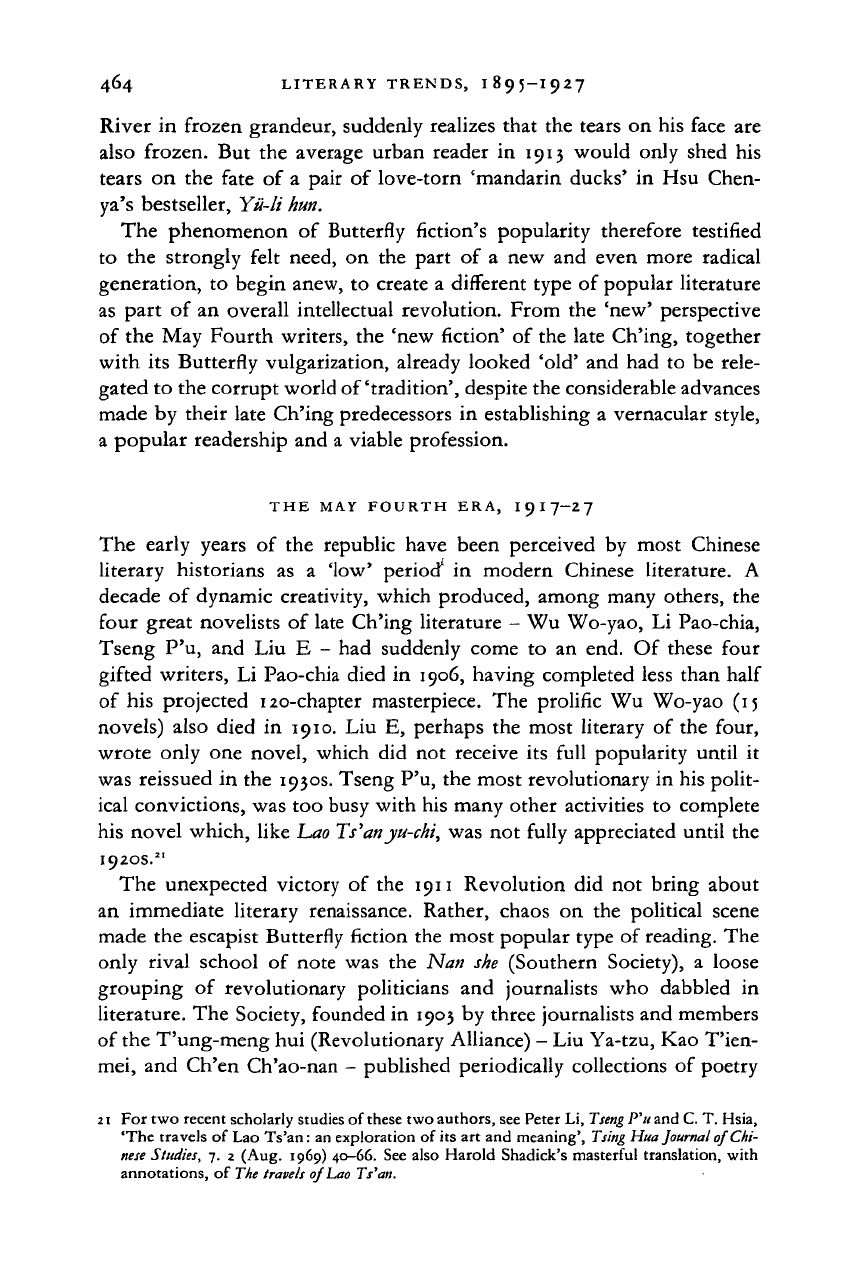
464 LITERARY TRENDS, 1895-I927
River
in
frozen grandeur, suddenly realizes that
the
tears
on
his
face
are
also frozen.
But the
average urban reader
in
1913
would only shed
his
tears
on the
fate
of a
pair
of
love-torn 'mandarin ducks'
in
Hsu
Chen-
ya's bestseller, Yu-li
hurt.
The phenomenon
of
Butterfly fiction's popularity therefore testified
to
the
strongly felt need,
on the
part
of a
new
and
even more radical
generation,
to
begin anew,
to
create
a
different type
of
popular literature
as part
of
an
overall intellectual revolution. From
the
'new'
perspective
of
the May
Fourth writers,
the
'new
fiction'
of
the
late Ch'ing, together
with
its
Butterfly vulgarization, already looked
'old' and had
to be
rele-
gated
to the
corrupt world of'tradition', despite the considerable advances
made
by
their late Ch'ing predecessors
in
establishing
a
vernacular style,
a popular readership
and a
viable profession.
THE
MAY
FOURTH
ERA, I 9 I 7-2 7
The early years
of the
republic have been perceived
by
most Chinese
literary historians
as a 'low'
period*
in
modern Chinese literature.
A
decade
of
dynamic creativity, which produced, among many others,
the
four great novelists
of
late Ch'ing literature
-
Wu
Wo-yao,
Li
Pao-chia,
Tseng
P'u, and Liu E -
had
suddenly come
to an
end.
Of
these four
gifted writers,
Li
Pao-chia died
in
1906, having completed less than half
of
his
projected 120-chapter masterpiece.
The
prolific
Wu
Wo-yao
(15
novels) also died
in
1910.
Liu E,
perhaps
the
most literary
of
the
four,
wrote only
one
novel, which
did not
receive
its
full popularity until
it
was reissued
in
the
1930s. Tseng
P'u, the
most revolutionary
in
his
polit-
ical convictions,
was too
busy with
his
many other activities
to
complete
his novel which, like Lao
Ts'anyu-chi,
was not
fully appreciated until
the
1920s.
21
The unexpected victory
of
the 1911
Revolution
did not
bring about
an immediate literary renaissance. Rather, chaos
on the
political scene
made
the
escapist Butterfly fiction
the
most popular type
of
reading.
The
only rival school
of
note
was
the Nan
she (Southern Society),
a
loose
grouping
of
revolutionary politicians
and
journalists
who
dabbled
in
literature.
The
Society, founded
in
1903
by
three journalists
and
members
of the T'ung-meng
hui
(Revolutionary Alliance)
-
Liu
Ya-tzu,
Kao
T'ien-
mei,
and
Ch'en Ch'ao-nan
-
published periodically collections
of
poetry
21
For
two recent scholarly studies
of
these
two authors, see Peter Li,
Tseng
P'u
and C.
T.
Hsia,
'The travels
of
Lao Ts'an:
an
exploration
of
its
art and
meaning',
Tsing
HIM
Journal
of Chi-
nese
Studies,
7.
2 (Aug.
1969) 40-66.
See
also Harold Shadick's masterful translation, with
annotations,
of
The travels
of
Lao
Ts'an.
Cambridge Histories Online © Cambridge University Press, 2008
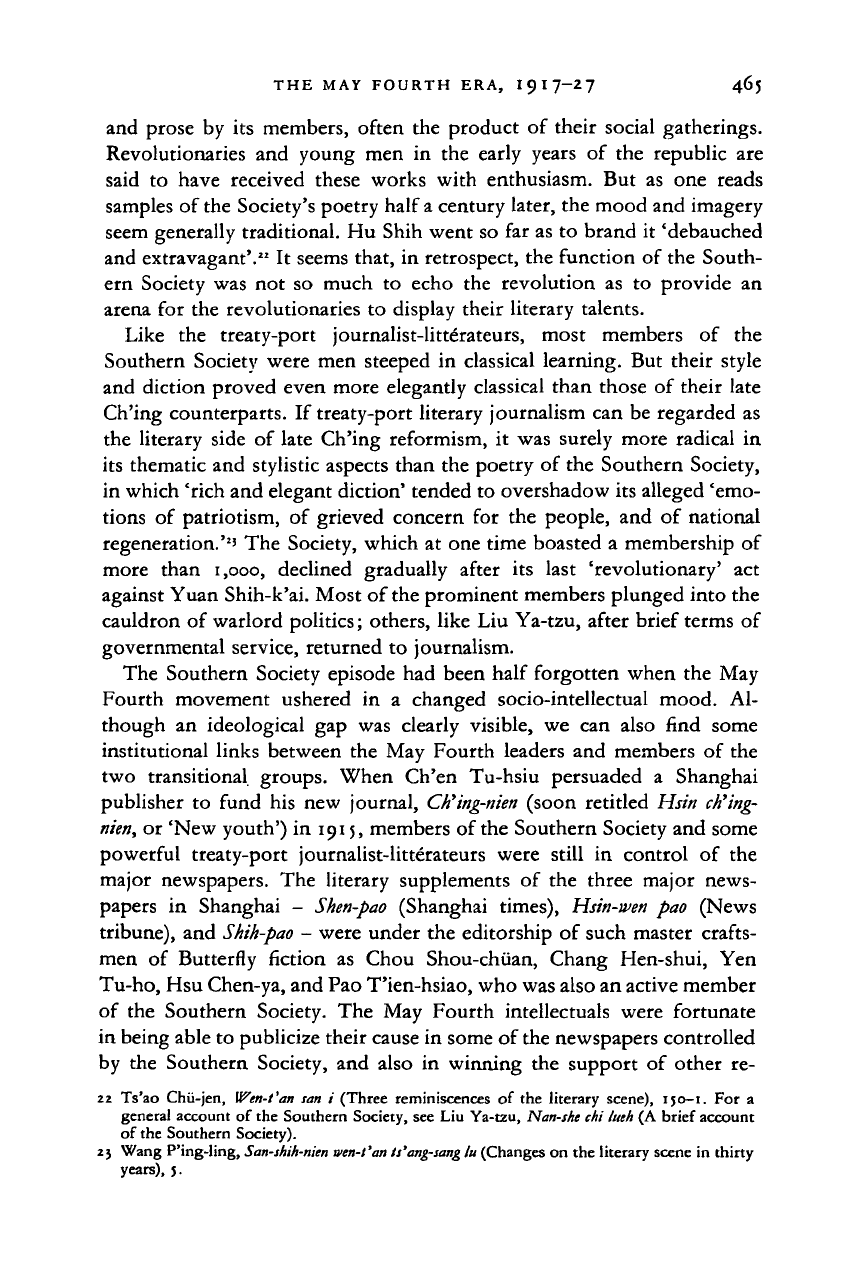
THE MAY FOURTH ERA, I 9 I 7-2 7 465
and prose by its members, often the product of their social gatherings.
Revolutionaries and young men in the early years of the republic are
said to have received these works with enthusiasm. But as one reads
samples of the Society's poetry half
a
century later, the mood and imagery
seem generally traditional. Hu Shih went so far as to brand it 'debauched
and extravagant'.
22
It seems that, in retrospect, the function of the South-
ern Society was not so much to echo the revolution as to provide an
arena for the revolutionaries to display their literary talents.
Like the treaty-port journalist-littdrateurs, most members of the
Southern Society were men steeped in classical learning. But their style
and diction proved even more elegantly classical than those of their late
Ch'ing counterparts. If treaty-port literary journalism can be regarded as
the literary side of late Ch'ing reformism, it was surely more radical in
its thematic and stylistic aspects than the poetry of the Southern Society,
in which 'rich and elegant diction' tended to overshadow its alleged 'emo-
tions of patriotism, of grieved concern for the people, and of national
regeneration.'
2
' The Society, which at one time boasted a membership of
more than
1,000,
declined gradually after its last 'revolutionary' act
against Yuan Shih-k'ai. Most of the prominent members plunged into the
cauldron of warlord politics; others, like Liu Ya-tzu, after brief terms of
governmental service, returned to journalism.
The Southern Society episode had been half forgotten when the May
Fourth movement ushered in a changed socio-intellectual mood. Al-
though an ideological gap was clearly visible, we can also find some
institutional links between the May Fourth leaders and members of the
two transitional groups. When Ch'en Tu-hsiu persuaded a Shanghai
publisher to fund his new journal,
Ch'ing-nien
(soon retitled Hsin
ch'ing-
nien,
or 'New youth') in 1915, members of the Southern Society and some
powerful treaty-port journalist-litterateurs were still in control of the
major newspapers. The literary supplements of the three major news-
papers in Shanghai -
Shen-pao
(Shanghai times),
Hsin-wen
pao (News
tribune), and
Shih-pao
- were under the editorship of such master crafts-
men of Butterfly fiction as Chou Shou-chiian, Chang Hen-shui, Yen
Tu-ho,
Hsu Chen-ya, and Pao T'ien-hsiao, who was also an active member
of the Southern Society. The May Fourth intellectuals were fortunate
in being able to publicize their cause in some of the newspapers controlled
by the Southern Society, and also in winning the support of other re-
22 Ts'ao Chii-jen, Wen-t'an san i (Three reminiscences of the literary scene),
150-1.
For a
general account of the Southern Society, see Liu Ya-tzu, Nan-she chi
Inch
(A brief account
of the Southern Society).
23 Wang P'ing-ling,
San-shih-nien wen-t'an ts'ang-sang
lu (Changes on the literary scene in thirty
years),
5.
Cambridge Histories Online © Cambridge University Press, 2008
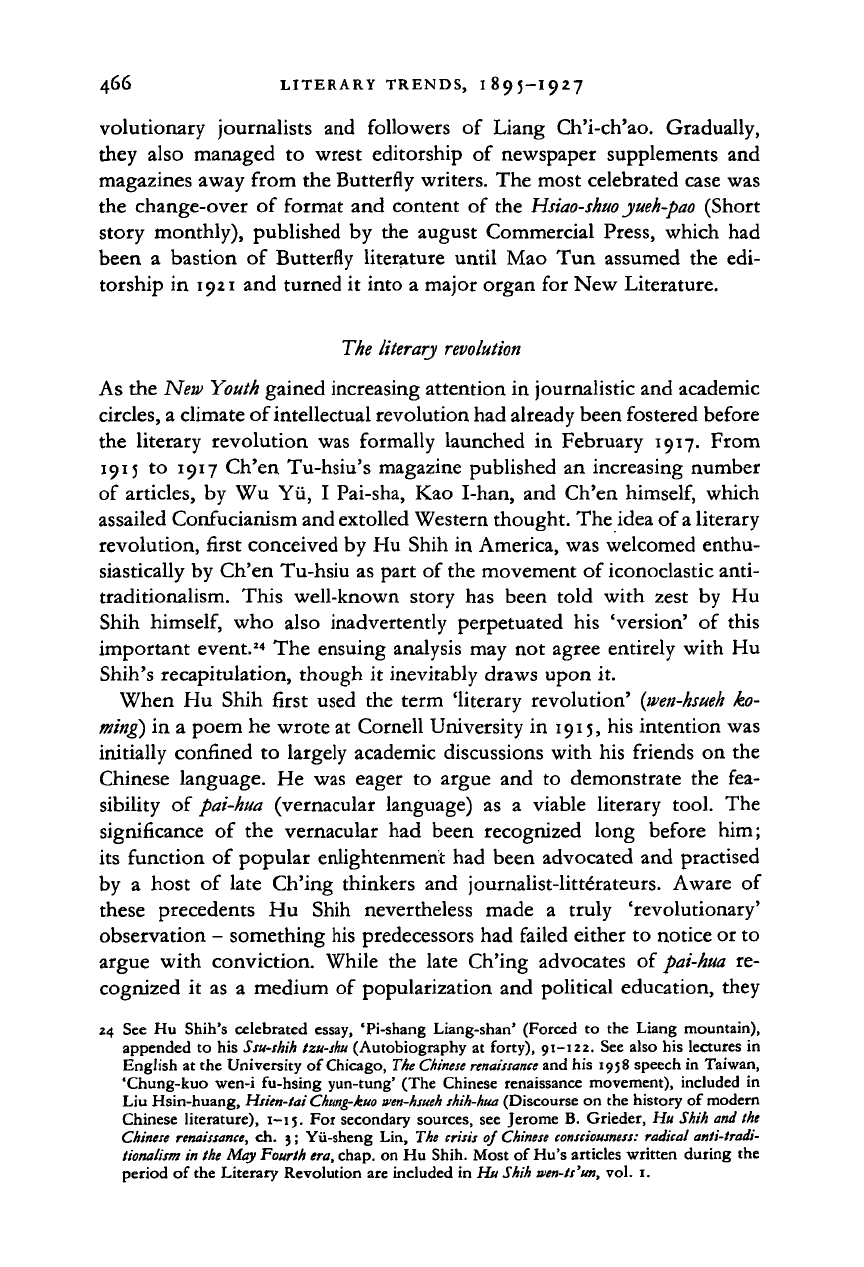
466 LITERARY TRENDS, 1895-1927
volutionary journalists
and
followers
of
Liang Ch'i-ch'ao. Gradually,
they also managed
to
wrest editorship
of
newspaper supplements and
magazines away from the Butterfly writers. The most celebrated case was
the change-over
of
format and content
of
the
Hsiao-shuo yueh-pao
(Short
story monthly), published
by
the august Commercial Press, which had
been
a
bastion
of
Butterfly literature until Mao Tun assumed the edi-
torship in 1921 and turned
it
into
a
major organ for New Literature.
The literary
revolution
As the New Youth gained increasing attention in journalistic and academic
circles, a climate of intellectual revolution had already been fostered before
the literary revolution was formally launched
in
February 1917. From
1915
to
1917 Ch'en Tu-hsiu's magazine published an increasing number
of articles,
by
Wu Yvi,
I
Pai-sha, Kao I-han, and Ch'en
himself,
which
assailed Confucianism and extolled Western thought. The idea of
a
literary
revolution, first conceived by Hu Shih in America, was welcomed enthu-
siastically by Ch'en Tu-hsiu as part of the movement of iconoclastic anti-
traditionalism. This well-known story has been told with zest
by Hu
Shih
himself,
who also inadvertently perpetuated
his
'version'
of
this
important event.
24
The ensuing analysis may not agree entirely with Hu
Shih's recapitulation, though
it
inevitably draws upon it.
When
Hu
Shih first used the term 'literary revolution'
(wen-hsueh
ko-
ming)
in
a
poem he wrote at Cornell University in 1915, his intention was
initially confined
to
largely academic discussions with his friends on the
Chinese language.
He
was eager
to
argue and
to
demonstrate the
fea-
sibility
of
pai-hua
(vernacular language)
as a
viable literary tool.
The
significance
of
the vernacular had been recognized long before
him;
its function of popular enlightenment had been advocated and practised
by
a
host
of
late Ch'ing thinkers and journalist-litterateurs. Aware
of
these precedents
Hu
Shih nevertheless made
a
truly 'revolutionary'
observation
-
something his predecessors had failed either to notice or to
argue with conviction. While the late Ch'ing advocates of
pai-hua
re-
cognized
it
as
a
medium
of
popularization and political education, they
24 See Hu Shih's celebrated essay, 'Pi-shang Liang-shan' (Forced
to
the Liang mountain),
appended
to
his
Ssu-shih tzu-shu
(Autobiography at forty), 91-122. See also his lectures
in
English at the University of Chicago,
The Chinese renaissance
and his 1958 speech in Taiwan,
'Chung-kuo wen-i fu-hsing yun-tung' (The Chinese renaissance movement), included
in
Liu Hsin-huang, Hsien-tai
Chung-kuo wen-hsueh shih-hua
(Discourse on the history of modern
Chinese literature), 1-15. For secondary sources, see Jerome B. Grieder, Hu Shih and
the
Chinese renaissance,
ch. 3;
Yu-sheng Lin, The crisis
of
Chinese consciousness: radical anti-tradi-
tionalism in the May Fourth era, chap, on Hu Shih. Most of Hu's articles written during the
period of the Literary Revolution are included in Hu
Shih
wen-ts'un,
vol.
1.
Cambridge Histories Online © Cambridge University Press, 2008
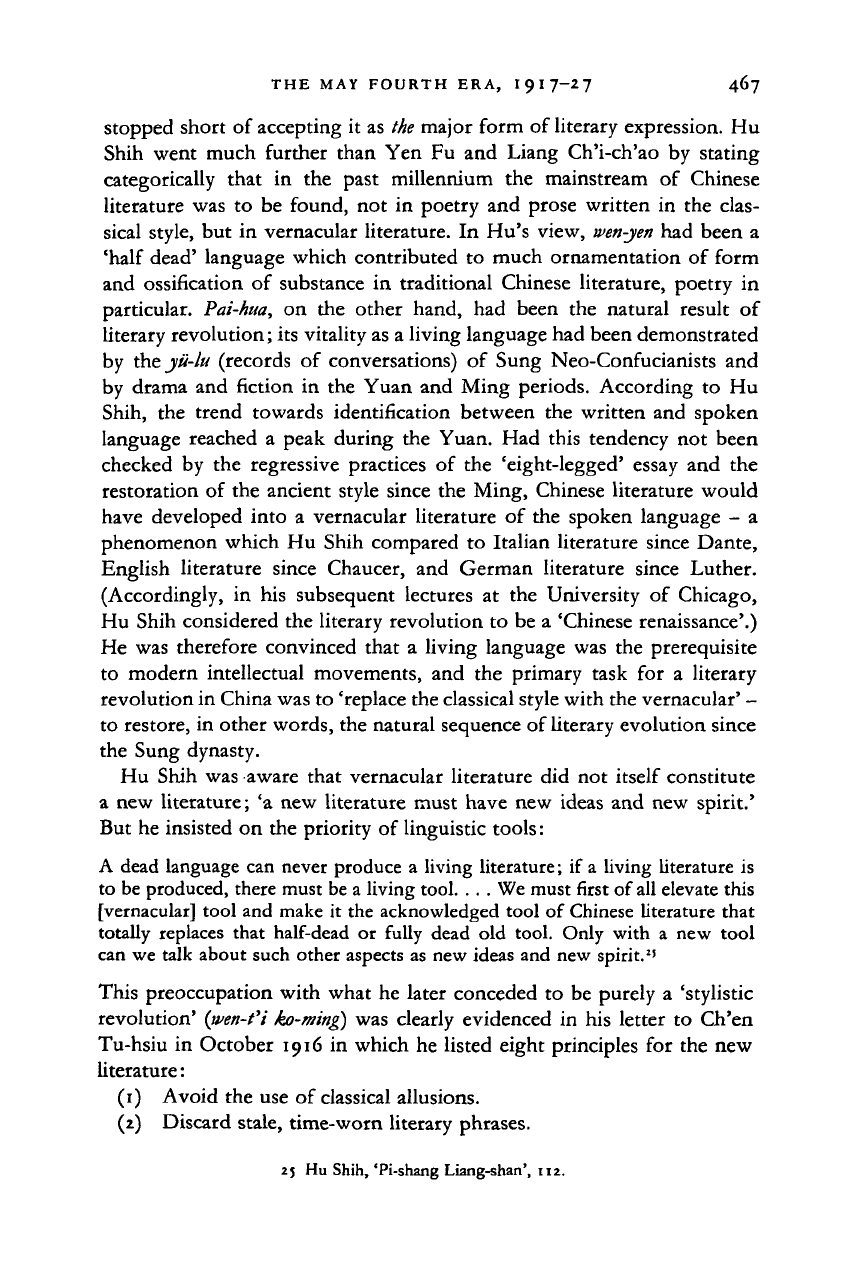
THE MAY
FOURTH
ERA, I 9 I 7-2 7 467
stopped short of accepting it as
the
major form of literary expression. Hu
Shih went much further than Yen Fu and Liang Ch'i-ch'ao by stating
categorically that in the past millennium the mainstream of Chinese
literature was to be found, not in poetry and prose written in the clas-
sical style, but in vernacular literature. In Hu's view,
wen-yen
had been a
'half dead' language which contributed to much ornamentation of form
and ossification of substance in traditional Chinese literature, poetry in
particular. Pai-hua, on the other hand, had been the natural result of
literary revolution; its vitality as a living language had been demonstrated
by the yii-lu (records of conversations) of Sung Neo-Confucianists and
by drama and fiction in the Yuan and Ming periods. According to Hu
Shih, the trend towards identification between the written and spoken
language reached a peak during the Yuan. Had this tendency not been
checked by the regressive practices of the 'eight-legged' essay and the
restoration of the ancient style since the Ming, Chinese literature would
have developed into a vernacular literature of the spoken language - a
phenomenon which Hu Shih compared to Italian literature since Dante,
English literature since Chaucer, and German literature since Luther.
(Accordingly, in his subsequent lectures at the University of Chicago,
Hu Shih considered the literary revolution to be a 'Chinese renaissance'.)
He was therefore convinced that a living language was the prerequisite
to modern intellectual movements, and the primary task for a literary
revolution in China was to 'replace the classical style with the vernacular' -
to restore, in other words, the natural sequence of literary evolution since
the Sung dynasty.
Hu Shih was aware that vernacular literature did not itself constitute
a new literature; 'a new literature must have new ideas and new spirit.'
But he insisted on the priority of linguistic tools:
A dead language can never produce a living literature; if a living literature is
to be produced, there must be a living tool. . . . We must first of
all
elevate this
[vernacular] tool and make it the acknowledged tool of Chinese literature that
totally replaces that half-dead or fully dead old tool. Only with a new tool
can we talk about such other aspects as new ideas and new spirit.
2
'
This preoccupation with what he later conceded to be purely a 'stylistic
revolution' {wen-fi
ko-ming)
was clearly evidenced in his letter to Ch'en
Tu-hsiu in October 1916 in which he listed eight principles for the new
literature:
(1) Avoid the use of classical allusions.
(2) Discard stale, time-worn literary phrases.
25 Hu Shih, 'Pi-shang Liang-shan', 112.
Cambridge Histories Online © Cambridge University Press, 2008
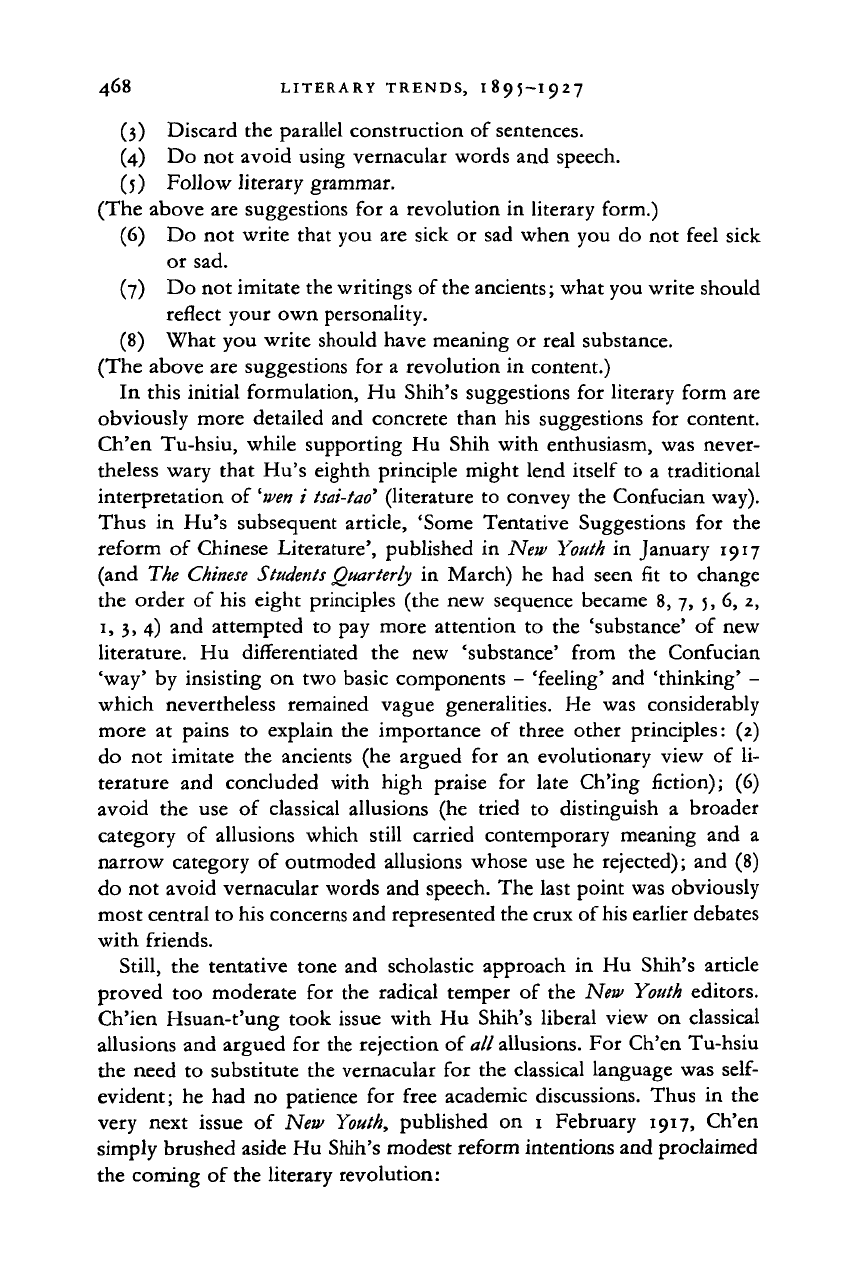
468 LITERARY TRENDS, 1895-I927
(3) Discard the parallel construction of sentences.
(4) Do not avoid using vernacular words and speech.
(5) Follow literary grammar.
(The above are suggestions for a revolution in literary form.)
(6) Do not write that you are sick
or
sad when you do not feel sick
or sad.
(7) Do not imitate the writings of the ancients; what you write should
reflect your own personality.
(8) What you write should have meaning or real substance.
(The above are suggestions for a revolution in content.)
In this initial formulation, Hu Shih's suggestions for literary form are
obviously more detailed and concrete than his suggestions
for
content.
Ch'en Tu-hsiu, while supporting Hu Shih with enthusiasm, was never-
theless wary that Hu's eighth principle might lend itself to
a
traditional
interpretation
of
'wen
i
tsar-tad"
(literature
to
convey the Confucian way).
Thus
in
Hu's subsequent article, 'Some Tentative Suggestions
for the
reform
of
Chinese Literature', published
in
New Youth
in
January 1917
(and The
Chinese Students Quarterly
in
March)
he
had seen
fit to
change
the order
of
his eight principles (the new sequence became 8, 7, 5, 6, 2,
1,
3, 4) and attempted
to
pay more attention
to
the 'substance'
of
new
literature.
Hu
differentiated
the new
'substance' from
the
Confucian
'way' by insisting
on
two basic components
-
'feeling' and 'thinking'
-
which nevertheless remained vague generalities.
He
was considerably
more
at
pains
to
explain the importance
of
three other principles:
(2)
do not imitate the ancients (he argued
for an
evolutionary view
of
li-
terature
and
concluded with high praise
for
late Ch'ing fiction);
(6)
avoid
the
use
of
classical allusions (he tried
to
distinguish
a
broader
category
of
allusions which still carried contemporary meaning and
a
narrow category
of
outmoded allusions whose use he rejected); and (8)
do not avoid vernacular words and speech. The last point was obviously
most central to his concerns and represented the crux of
his
earlier debates
with friends.
Still, the tentative tone and scholastic approach
in
Hu Shih's article
proved too moderate
for
the radical temper
of
the New Youth editors.
Ch'ien Hsuan-t'ung took issue with Hu Shih's liberal view on classical
allusions and argued for the rejection of all allusions. For Ch'en Tu-hsiu
the need
to
substitute the vernacular for the classical language was
self-
evident; he had no patience for free academic discussions. Thus
in
the
very next issue
of
New Youth, published
on 1
February 1917, Ch'en
simply brushed aside Hu Shih's modest reform intentions and proclaimed
the coming of the literary revolution:
Cambridge Histories Online © Cambridge University Press, 2008
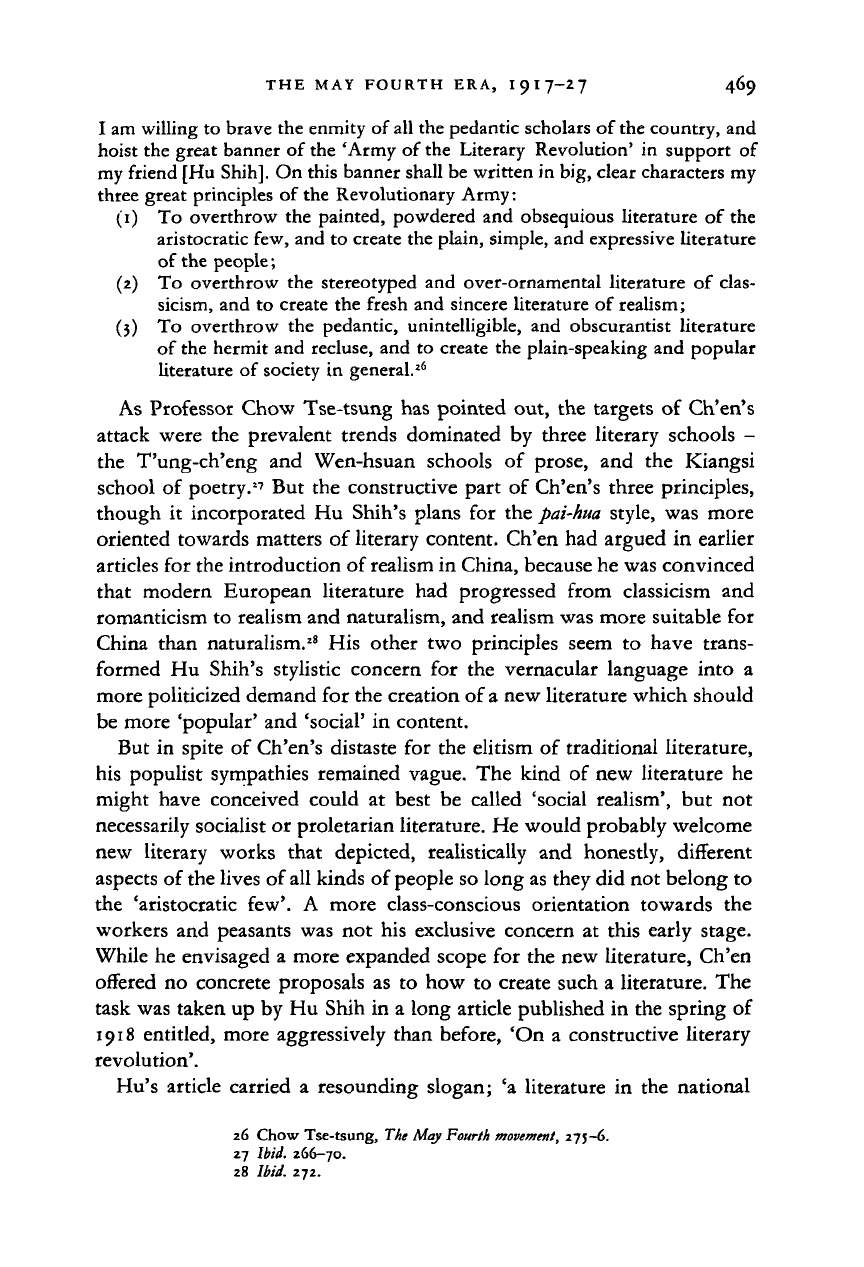
THE MAY FOURTH ERA, 1917-27 469
I am willing to brave the enmity of
all
the pedantic scholars
of
the
country, and
hoist the great banner
of
the 'Army
of
the Literary Revolution'
in
support
of
my friend [Hu
Shih].
On this banner shall be written in big, clear characters my
three great principles
of
the Revolutionary Army:
(1)
To
overthrow
the
painted, powdered
and
obsequious literature
of
the
aristocratic few, and
to
create the plain, simple, and expressive literature
of the people;
(2)
To
overthrow
the
stereotyped
and
over-ornamental literature
of
clas-
sicism, and
to
create the fresh and sincere literature
of
realism;
(3)
To
overthrow
the
pedantic, unintelligible,
and
obscurantist literature
of the hermit and recluse,
and to
create the plain-speaking and popular
literature
of
society
in
general.
26
As Professor Chow Tse-tsung
has
pointed
out, the
targets
of
Ch'en's
attack were
the
prevalent trends dominated
by
three literary schools
-
the T'ung-ch'eng
and
Wen-hsuan schools
of
prose,
and the
Kiangsi
school
of
poetry.
27
But the
constructive part
of
Ch'en's three principles,
though
it
incorporated
Hu
Shih's plans
for
the
pai-hua
style,
was
more
oriented towards matters
of
literary content. Ch'en
had
argued
in
earlier
articles
for
the introduction
of
realism in China, because he was convinced
that modern European literature
had
progressed from classicism
and
romanticism
to
realism and naturalism,
and
realism was more suitable
for
China than naturalism.
28
His
other
two
principles seem
to
have trans-
formed
Hu
Shih's stylistic concern
for the
vernacular language into
a
more politicized demand
for
the creation
of
a
new literature which should
be more 'popular'
and
'social'
in
content.
But
in
spite
of
Ch'en's distaste
for the
elitism
of
traditional literature,
his populist sympathies remained vague.
The
kind
of
new literature
he
might have conceived could
at
best
be
called 'social realism',
but not
necessarily socialist
or
proletarian literature.
He
would probably welcome
new literary works that depicted, realistically
and
honestly, different
aspects
of
the lives
of
all kinds
of
people so long as they did not belong
to
the 'aristocratic
few'. A
more class-conscious orientation towards
the
workers
and
peasants
was not his
exclusive concern
at
this early stage.
While
he
envisaged
a
more expanded scope
for the
new literature, Ch'en
offered
no
concrete proposals
as to how to
create such
a
literature.
The
task was taken up
by Hu
Shih
in a
long article published
in the
spring
of
1918 entitled, more aggressively than before,
'On a
constructive literary
revolution'.
Hu's article carried
a
resounding slogan;
'a
literature
in the
national
26 Chow Tse-tsung, The May
Fourth
movement,
275-6.
27
Ibid.
266—70.
28
Ibid.
272.
Cambridge Histories Online © Cambridge University Press, 2008
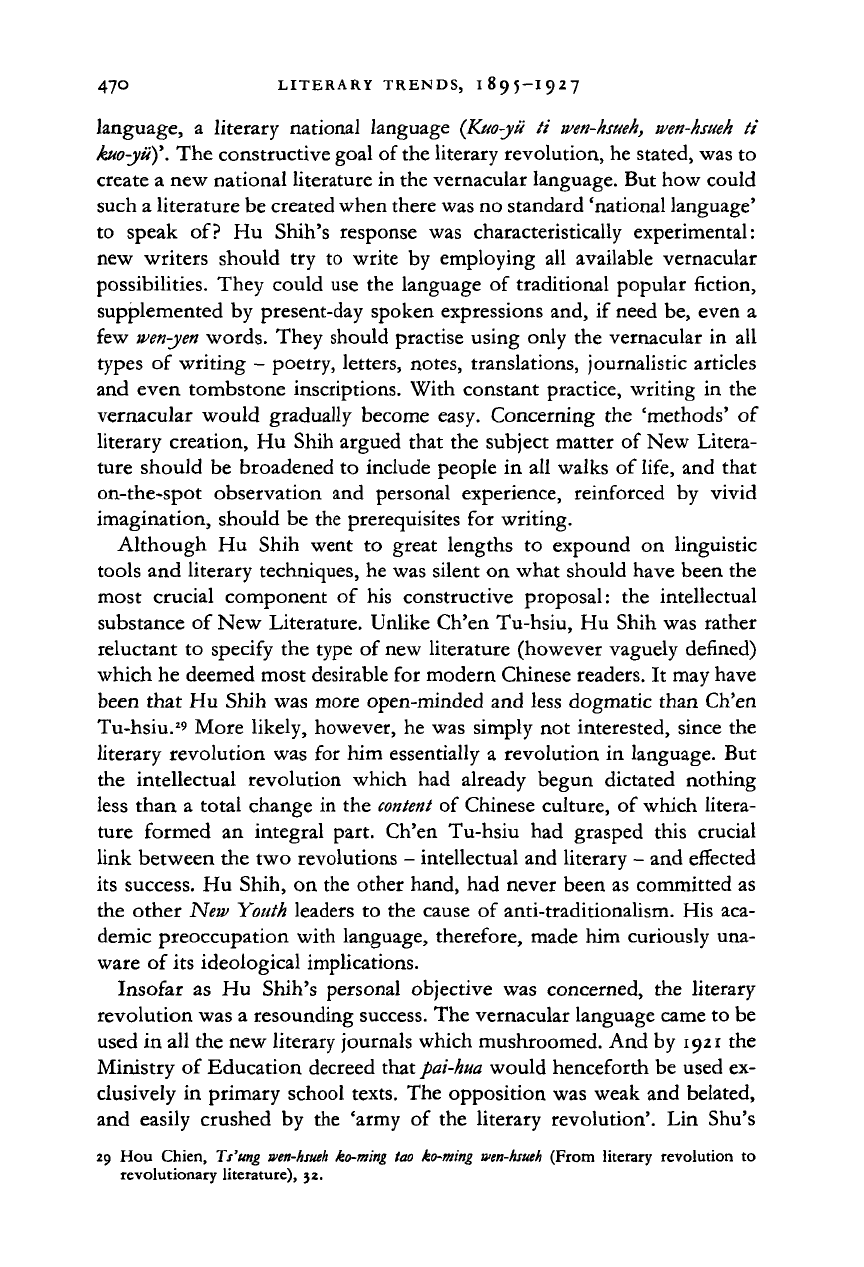
47° LITERARY TRENDS, 1895-I927
language,
a
literary national language
(Kuo-yii
ti
wen-hsueh,
wen-hsueh
ti
kuo-yii)
y
.
The constructive goal of the literary revolution, he stated, was
to
create
a
new national literature in the vernacular language. But how could
such a literature be created when there was no standard 'national language'
to speak
of? Hu
Shih's response
was
characteristically experimental:
new writers should
try to
write
by
employing
all
available vernacular
possibilities. They could use the language
of
traditional popular fiction,
supplemented
by
present-day spoken expressions and,
if
need be, even
a
few
wen-yen
words. They should practise using only the vernacular
in all
types
of
writing
-
poetry, letters, notes, translations, journalistic articles
and even tombstone inscriptions. With constant practice, writing
in the
vernacular would gradually become easy. Concerning
the
'methods'
of
literary creation,
Hu
Shih argued that the subject matter
of
New Litera-
ture should
be
broadened
to
include people
in
all walks
of
life, and that
on-the-spot observation
and
personal experience, reinforced
by
vivid
imagination, should be the prerequisites
for
writing.
Although
Hu
Shih went
to
great lengths
to
expound
on
linguistic
tools and literary techniques, he was silent on what should have been the
most crucial component
of his
constructive proposal:
the
intellectual
substance
of
New Literature. Unlike Ch'en Tu-hsiu,
Hu
Shih was rather
reluctant
to
specify the type
of
new literature (however vaguely defined)
which he deemed most desirable for modern Chinese readers.
It
may have
been that
Hu
Shih was more open-minded and less dogmatic than Ch'en
Tu-hsiu.
29
More likely, however,
he
was simply not interested, since
the
literary revolution was
for
him essentially
a
revolution
in
language.
But
the intellectual revolution which
had
already begun dictated nothing
less than
a
total change
in
the
content
of
Chinese culture,
of
which litera-
ture formed
an
integral part. Ch'en Tu-hsiu
had
grasped this crucial
link between the two revolutions
-
intellectual and literary
-
and effected
its success.
Hu
Shih,
on
the other hand, had never been as committed
as
the other New Youth leaders
to
the cause
of
anti-traditionalism. His aca-
demic preoccupation with language, therefore, made him curiously una-
ware
of
its ideological implications.
Insofar
as Hu
Shih's personal objective
was
concerned,
the
literary
revolution was
a
resounding success. The vernacular language came to be
used in all the new literary journals which mushroomed. And by 1921
the
Ministry
of
Education decreed that
pai-hua
would henceforth be used ex-
clusively
in
primary school texts. The opposition was weak and belated,
and easily crushed
by the
'army
of the
literary revolution'.
Lin
Shu's
29
Hou
Chien, Ts'tmg
wen-hsueh
ko-ming too ko-ming
wen-hsueh
(From literary revolution
to
revolutionary literature), 32.
Cambridge Histories Online © Cambridge University Press, 2008
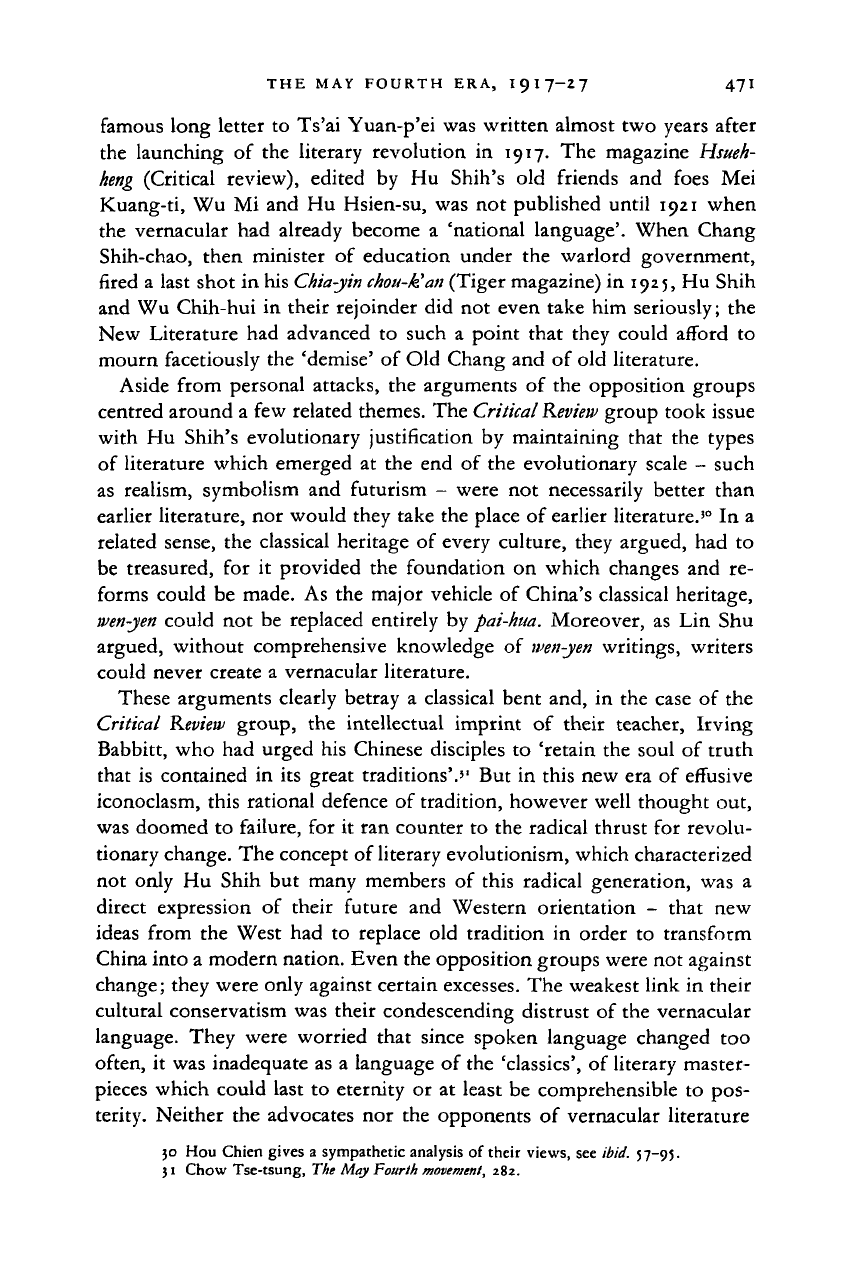
THE MAY FOURTH ERA, I 9 I 7-2 7 471
famous long letter to Ts'ai Yuan-p'ei was written almost two years after
the launching of the literary revolution in 1917. The magazine Hsueh-
heng
(Critical review), edited by Hu Shih's old friends and foes Mei
Kuang-ti, Wu Mi and Hu Hsien-su, was not published until 1921 when
the vernacular had already become a 'national language'. When Chang
Shih-chao, then minister of education under the warlord government,
fired a last shot in his
Chia-jin chou-k'an
(Tiger magazine) in 1925, Hu Shih
and Wu Chih-hui in their rejoinder did not even take him seriously; the
New Literature had advanced to such a point that they could afford to
mourn facetiously the 'demise' of Old Chang and of old literature.
Aside from personal attacks, the arguments of the opposition groups
centred around a few related themes. The
Critical Review
group took issue
with Hu Shih's evolutionary justification by maintaining that the types
of literature which emerged at the end of the evolutionary scale - such
as realism, symbolism and futurism - were not necessarily better than
earlier literature, nor would they take the place of earlier literature.'
0
In a
related sense, the classical heritage of every culture, they argued, had to
be treasured, for it provided the foundation on which changes and re-
forms could be made. As the major vehicle of China's classical heritage,
wen-yen
could not be replaced entirely by
pai-hua.
Moreover, as Lin Shu
argued, without comprehensive knowledge of
wen-yen
writings, writers
could never create a vernacular literature.
These arguments clearly betray a classical bent and, in the case of the
Critical
Review
group, the intellectual imprint of their teacher, Irving
Babbitt, who had urged his Chinese disciples to 'retain the soul of truth
that is contained in its great traditions'.'• But in this new era of effusive
iconoclasm, this rational defence of tradition, however well thought out,
was doomed to failure, for it ran counter to the radical thrust for revolu-
tionary change. The concept of literary evolutionism, which characterized
not only Hu Shih but many members of this radical generation, was a
direct expression of their future and Western orientation - that new
ideas from the West had to replace old tradition in order to transform
China into a modern nation. Even the opposition groups were not against
change; they were only against certain excesses. The weakest link in their
cultural conservatism was their condescending distrust of the vernacular
language. They were worried that since spoken language changed too
often, it was inadequate as a language of the 'classics', of literary master-
pieces which could last to eternity or at least be comprehensible to pos-
terity. Neither the advocates nor the opponents of vernacular literature
30 Hou Chien gives a sympathetic analysis of their views, see
ibid.
57-95.
31 Chow Tse-tsung, The May Fourth
movement,
282.
Cambridge Histories Online © Cambridge University Press, 2008
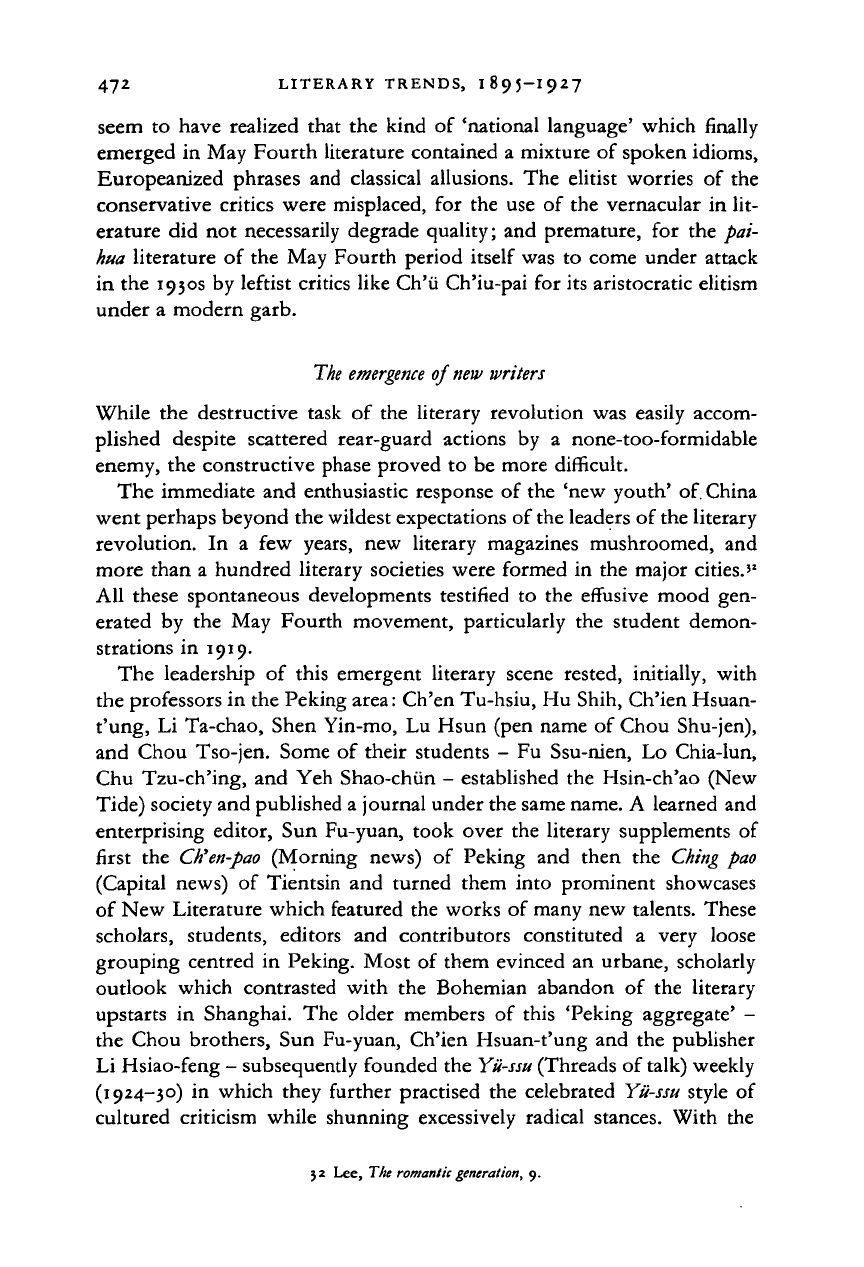
472 LITERARY TRENDS, 1895-I927
seem
to
have realized that
the
kind
of
'national language' which finally
emerged
in
May Fourth literature contained
a
mixture
of
spoken idioms,
Europeanized phrases
and
classical allusions.
The
elitist worries
of
the
conservative critics were misplaced,
for
the use
of
the
vernacular
in lit-
erature
did not
necessarily degrade quality;
and
premature,
for
the pai-
hua literature
of
the May Fourth period itself was
to
come under attack
in
the
1930s
by
leftist critics like Ch'ti Ch'iu-pai
for
its aristocratic elitism
under
a
modern garb.
The emergence
of
new writers
While
the
destructive task
of
the
literary revolution
was
easily accom-
plished despite scattered rear-guard actions
by a
none-too-formidable
enemy,
the
constructive phase proved
to be
more difficult.
The immediate
and
enthusiastic response
of
the
'new
youth' of. China
went perhaps beyond the wildest expectations
of
the leaders
of
the literary
revolution.
In a few
years,
new
literary magazines mushroomed,
and
more than
a
hundred literary societies were formed
in
the
major cities.'
2
All these spontaneous developments testified
to
the
effusive mood
gen-
erated
by
the May
Fourth movement, particularly
the
student demon-
strations
in
1919.
The leadership
of
this emergent literary scene rested, initially, with
the professors
in
the Peking area: Ch'en Tu-hsiu,
Hu
Shih, Ch'ien Hsuan-
t'ung,
Li
Ta-chao, Shen Yin-mo,
Lu
Hsun
(pen
name
of
Chou Shu-jen),
and Chou Tso-jen. Some
of
their students
-
Fu
Ssu-nien,
Lo
Chia-lun,
Chu Tzu-ch'ing,
and Yeh
Shao-chiin
-
established
the
Hsin-ch'ao
(New
Tide) society and published
a
journal under the same name.
A
learned
and
enterprising editor,
Sun
Fu-yuan, took over
the
literary supplements
of
first the
Ch'en-pao
(Morning news)
of
Peking
and
then
the
Ching
pao
(Capital news)
of
Tientsin
and
turned them into prominent showcases
of New Literature which featured
the
works
of
many new talents. These
scholars, students, editors
and
contributors constituted
a
very loose
grouping centred
in
Peking. Most
of
them evinced
an
urbane, scholarly
outlook which contrasted with
the
Bohemian abandon
of
the
literary
upstarts
in
Shanghai.
The
older members
of
this 'Peking aggregate'
-
the Chou brothers,
Sun
Fu-yuan, Ch'ien Hsuan-t'ung
and the
publisher
Li Hsiao-feng
-
subsequently founded
the
Yii-ssu
(Threads
of
talk) weekly
(1924-30)
in
which they further practised
the
celebrated Yii-ssu style
of
cultured criticism while shunning excessively radical stances. With
the
}
2
Lee, The
romantic generation,
9.
Cambridge Histories Online © Cambridge University Press, 2008
